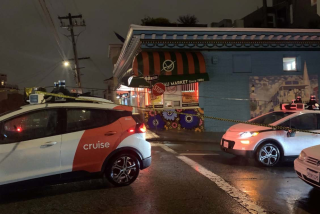OCTA Board Adopts Strict Controls for New Purchases : Transportation: Controversial SuperBus contract prompts the revised rules but will not be subject to them.
- Share via
SANTA ANA — Orange County transportation officials adopted strict controls Monday for future purchases of products and services in the aftermath of a controversial $4-million contract for 10 extra-large commuter buses, known as SuperBuses.
The new procedures approved by the Orange County Transportation Authority board require:
* Staff visits to factory sites and an independent expert’s evaluation of any contract in excess of $500,000 if the contractor is the sole provider of a product or service.
* Better documentation on non-competitive bids, such as the deal with SuperBus Inc., and certified financial statements from companies when purchases exceed an as-yet-undetermined amount or when a contract will continue for several years.
In approving the strict rules, however, OCTA board members voted to continue negotiating with SuperBus Inc. for the 10 vehicles and not make that previously negotiated contract subject to the stricter controls. The board is anxious to get the buses so that it can resolve the problem of overloaded buses being stopped by the California Highway Patrol.
Board of Supervisors Chairman Roger R. Stanton, the OCTA chairman, called for a review of the SuperBus deal after The Times last month reported that company officials had been sued for failure to pay rent and that some of the firm’s officers faced accusations of business fraud in lawsuits unrelated to SuperBus.
Also, The Times reported that the company is now being run out of SuperBus Chief Executive James F. Elder’s residence in Saratoga and that the firm is relying on the Mexican government for money to manufacture the buses at a new factory in Baja California.
Elder has strongly denied the charges contained in the lawsuits and has defended the firm’s ability to deliver the ordered buses on time and within budget.
The Times investigation also found that retired Orange County supervisor Ralph B. Clark acted as an adviser to SuperBus before the Transportation Authority’s approval of the purchase order last October.
The 56-seat vehicles, which can also carry standees without violating per-axle load limits, resemble low-slung horse trailers pulled by truck cabs. They are more comfortable and can carry more passengers than regular buses.
Stanton said he abstained on Monday’s decision to continue negotiations with SuperBus to be consistent with his previous criticism of the deal. Among the issues still being negotiated are whether the company can use a $760,000 letter of credit in lieu of a performance bond.
“I have not been enamored of the SuperBus configuration since my days at the Orange County Transit District,” Stanton said. The transit district is now a division of OCTA. Stanton had abstained on previous SuperBus votes because he questioned both the need for the vehicles and the sole-source aspect of the purchase order.
Although SuperBus vehicles are intended to relieve overcrowded routes, Stanton has said he favors adding more regular buses.
The debate intensified during Monday’s OCTA meeting as a frequent bus passenger said it is time to get more or larger buses. He complained that overcrowding is so severe that he was recently passed up twice in a row while standing at the same bus stop.
The passenger, John Gabriels of Santa Ana, also noted the plight of the mostly Latino ridership that has several times been forced off buses along the one route where the CHP has been frequently citing buses that exceed weight limits.
“These people aren’t being put off buses in any other section of the county,” said Gabriels. “It has the perception of racism.”
‘I’m offended (by that charge),” said La Habra Councilman William D. Mahoney, a member of the OCTA board. “You should take your complaint to the CHP. . . . They’re the ones picking this route out.”
For several months, a single CHP officer has been stopping the Line 85 bus on its early morning journey between Santa Ana and South County. Some standing passengers--mostly Latinos on their way to work--have been ordered off the vehicle.
OCTA officials say the CHP is discriminating against OCTA because overloaded buses in other counties are not being stopped. CHP officials counter that other CHP offices will begin enforcing the rules more often once officers become more familiar with the issue.
Line 85 has been singled out, CHP Sgt. Bill Snell said recently, because it’s in an area being patrolled by the lone officer assigned by Snell to inspect buses.
OCTA is seeking legislation that would change the federal per-axle weight standards that are being applied by the CHP when it cites buses for being overweight.
More to Read
Sign up for Essential California
The most important California stories and recommendations in your inbox every morning.
You may occasionally receive promotional content from the Los Angeles Times.













